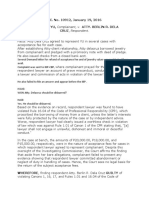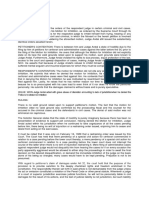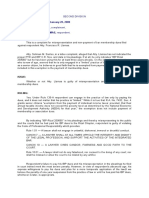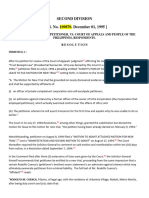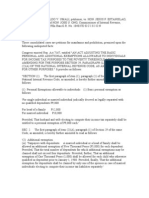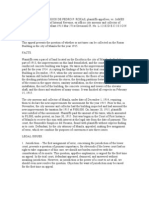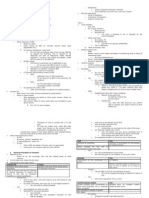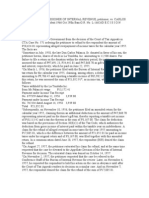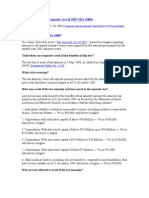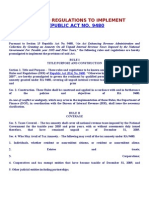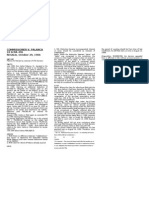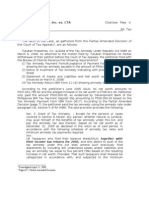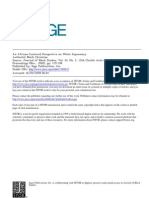0 ratings0% found this document useful (0 votes)
509 viewsCuenca V PPL
Cuenca V PPL
Uploaded by
cmv mendozaEdilberto Cuenca was convicted of violating the Trust Receipts Law and his conviction was affirmed by the Court of Appeals. He filed motions for a new trial based on newly discovered evidence, including an affidavit from his brother admitting liability. The Solicitor General recommended granting a new trial, as the brother's admission against interest may exonerate Edilberto. The Supreme Court granted the motion for a new trial, finding that while it previously did not have jurisdiction to consider new evidence, more recent cases have relaxed this rule. As the circumstances are similar and the Solicitor General does not object, a new trial is warranted.
Copyright:
Attribution Non-Commercial (BY-NC)
Available Formats
Download as DOC, PDF, TXT or read online from Scribd
Cuenca V PPL
Cuenca V PPL
Uploaded by
cmv mendoza0 ratings0% found this document useful (0 votes)
509 views1 pageEdilberto Cuenca was convicted of violating the Trust Receipts Law and his conviction was affirmed by the Court of Appeals. He filed motions for a new trial based on newly discovered evidence, including an affidavit from his brother admitting liability. The Solicitor General recommended granting a new trial, as the brother's admission against interest may exonerate Edilberto. The Supreme Court granted the motion for a new trial, finding that while it previously did not have jurisdiction to consider new evidence, more recent cases have relaxed this rule. As the circumstances are similar and the Solicitor General does not object, a new trial is warranted.
Original Title
cuenca v ppl
Copyright
© Attribution Non-Commercial (BY-NC)
Available Formats
DOC, PDF, TXT or read online from Scribd
Share this document
Did you find this document useful?
Is this content inappropriate?
Edilberto Cuenca was convicted of violating the Trust Receipts Law and his conviction was affirmed by the Court of Appeals. He filed motions for a new trial based on newly discovered evidence, including an affidavit from his brother admitting liability. The Solicitor General recommended granting a new trial, as the brother's admission against interest may exonerate Edilberto. The Supreme Court granted the motion for a new trial, finding that while it previously did not have jurisdiction to consider new evidence, more recent cases have relaxed this rule. As the circumstances are similar and the Solicitor General does not object, a new trial is warranted.
Copyright:
Attribution Non-Commercial (BY-NC)
Available Formats
Download as DOC, PDF, TXT or read online from Scribd
Download as doc, pdf, or txt
0 ratings0% found this document useful (0 votes)
509 views1 pageCuenca V PPL
Cuenca V PPL
Uploaded by
cmv mendozaEdilberto Cuenca was convicted of violating the Trust Receipts Law and his conviction was affirmed by the Court of Appeals. He filed motions for a new trial based on newly discovered evidence, including an affidavit from his brother admitting liability. The Solicitor General recommended granting a new trial, as the brother's admission against interest may exonerate Edilberto. The Supreme Court granted the motion for a new trial, finding that while it previously did not have jurisdiction to consider new evidence, more recent cases have relaxed this rule. As the circumstances are similar and the Solicitor General does not object, a new trial is warranted.
Copyright:
Attribution Non-Commercial (BY-NC)
Available Formats
Download as DOC, PDF, TXT or read online from Scribd
Download as doc, pdf, or txt
You are on page 1of 1
CUENCA v.
PEOPLE GR # 109870 FRANCISCO; December 1, 1995
NATURE FACTS - Petitioner Edilberto Cuenca (Edilberto) was convicted for violation of Trust Receipts Law. The CA affirmed the conviction. The petition for review of the CA decision was denied by SC in Resolution dated Feb 9, 1994. - He then filed a pleading entitled "SUBSTITUTION OF COUNSEL WITH MOTION FOR LEAVE TO FILE MOTION FOR NEW TRIAL" setting forth, in relation to the motion for new trial: 6. The Motion for New Trial shall be grounded on newly discovered evidence and excusable (sic) negligence, and shall be supported by affidavits of; (i) an officer of private complainant corporation who will exculpate petitioner; (ii) an admission against interest by a former officer of the owner of Ultra Corporation (the Corporation that employed petitioner), which actually exercised control over the affairs of Ultra; and (iii) the petitioner wherein he will assert innocence for the first time and explain why he was unable to do so earlier." - The Court in its July 27, 1994 Resolution, 4 among other things, granted the substitution but denied the motion for leave to file motion for new trial, "the petition having been already denied on February 9, 1994. - Notwithstanding, petitioner on August 8, 1994 filed a "MOTION TO ADMIT ATTACHED MOTION FOR NEW TRIAL", and a "MANIFESTATION AND SECOND MOTION TO ADMIT" on August 17, 1994. The Court thereafter required the Solicitor General to comment on said motion and manifestation within ten (10) days from notice, in a Resolution dated September 7, 1994. - The SolGen in his comment recommended that Edilberto be entitled to a new trial because the sworn statement of his brother Rodolfo Cuenca is an admission against interest which may ultimately exonerate petitioner from criminal liability. (See original for the full text.) Among the things he said were that Edilberto had no power to cause the payment of the Trust Receipts and that Edilberto was no longer president of Ultra by the time the final demand to pay was served. Rodolfo further said that he accepts personal liability for the receipts and that he will pay the civil obligations arising from the trust receipts. ISSUES WON Edilberto should be granted a new trial HELD YES. - Although in "Goduco v. CA" (14 SCRA 282 [1965]) decided some twenty (20) years ago, this Court ruled that it is not authorized to entertain a motion for reconsideration and/or new trial predicated on allegedly newly discovered evidence the rationale of which being: "The judgment of the Court of Appeals is conclusive as to the facts, and cannot be reviewed by the Supreme Court. Accordingly, in an appeal by certiorari to the Supreme Court, the latter has no jurisdiction to entertain a motion for new trial on the ground of newly discovered evidence, for only questions of fact are involved therein." the rule now appears to have been relaxed, if not abandoned, in subsequent cases like "Helmuth, Jr. v. People" and "People v. Amparado". - In both cases, the Court, opting to brush aside technicalities and despite the opposition of the Solicitor General, granted new trial to the convicted accused concerned on the basis of proposed testimonies or affidavits of persons which the Court considered as newly discovered and probably sufficient evidence to reverse the judgment of conviction. Being similarly circumstanced, there is no nagging reason why herein petitioner should be denied the same benefit. It becomes all the more plausible under the circumstances considering that the "People" does not raise any objection to a new trial, for which reason the Solicitor General ought to be specially commended for displaying once again such statesmanlike gesture of impartiality. The Solicitor General's finest hour, indeed. Disposition Petitioner's Motion For New Trial is hereby GRANTED. Let the case be RE-OPENED and REMANDED to the court of origin for reception of petitioner's evidence.
You might also like
- Ulep VS The Legal Aid ClinicDocument2 pagesUlep VS The Legal Aid ClinicDhen Gania85% (20)
- Chapter 1 - Introduction To Public AdministrationDocument16 pagesChapter 1 - Introduction To Public AdministrationMan Laksa80% (5)
- Barandon v. Ferrer Case DigestDocument1 pageBarandon v. Ferrer Case DigestJc Isidro100% (1)
- Laurel v. Delute AC No. 12298 September 1, 2020 FactsDocument2 pagesLaurel v. Delute AC No. 12298 September 1, 2020 FactsJoesil Dianne Sempron100% (1)
- 13 Former Assistant Prosecutor Barrozo DigestDocument2 pages13 Former Assistant Prosecutor Barrozo DigestRexNo ratings yet
- Hernando Petelo Vs Atty Socrates RiveraDocument1 pageHernando Petelo Vs Atty Socrates RiveraAlb Guarin100% (1)
- 19 Espiritu Vs Cabredo IVDocument1 page19 Espiritu Vs Cabredo IVKM Mac100% (1)
- Dr. Eduardo R. Alicias, JR V Atty. Vivencio S. BacligDocument2 pagesDr. Eduardo R. Alicias, JR V Atty. Vivencio S. BacligHannah RosarioNo ratings yet
- Case Digest - Linsangan v. Tolentino (Legal and Judicial Ethics)Document1 pageCase Digest - Linsangan v. Tolentino (Legal and Judicial Ethics)Ivy Eunice Estorba100% (1)
- NG V AlarDocument2 pagesNG V AlarRomnick Jesalva100% (3)
- Lim v. Rivera - June 2018 - DigestDocument3 pagesLim v. Rivera - June 2018 - DigestKyle Agustin100% (1)
- Promoters AgreementDocument8 pagesPromoters AgreementGazal SandhuNo ratings yet
- Michael Karlberg - THE Power of Discourse and The Discourse of PowerDocument23 pagesMichael Karlberg - THE Power of Discourse and The Discourse of PowerVincenzo SalvatoreNo ratings yet
- Legal Ethics Cases Canon 12 OnwardsDocument22 pagesLegal Ethics Cases Canon 12 OnwardsMaria Danice AngelaNo ratings yet
- Legal Ethics Case AnalysisDocument2 pagesLegal Ethics Case AnalysisRayBradleyEduardoNo ratings yet
- LCAS Writing Assignment #2Document12 pagesLCAS Writing Assignment #2Sleeping MimingNo ratings yet
- Collantes vs. RenomeronDocument2 pagesCollantes vs. RenomeronJEB100% (6)
- Ethics-Diana Ramos v. Atty. Jose R. Imbang - Sosa, Angel D.Document2 pagesEthics-Diana Ramos v. Atty. Jose R. Imbang - Sosa, Angel D.AngelNo ratings yet
- In Re Luis B. Tagorda G.R. No. 32329, March 23, 1929Document6 pagesIn Re Luis B. Tagorda G.R. No. 32329, March 23, 1929Adrian SimanganNo ratings yet
- Ruben A. Andaya V. Atty. Emmanuel Aladin A. Tumanda A.C. No. 12209, 18 February 2020, (Hernando, J.)Document3 pagesRuben A. Andaya V. Atty. Emmanuel Aladin A. Tumanda A.C. No. 12209, 18 February 2020, (Hernando, J.)Max RamosNo ratings yet
- Tarog V Ricafort My Digest-1Document2 pagesTarog V Ricafort My Digest-1Bryan-Charmaine ZamboNo ratings yet
- Cabiles V Cedo DigestDocument1 pageCabiles V Cedo Digestpj100% (1)
- Que Vs RevillaDocument2 pagesQue Vs Revillakitakattt100% (2)
- Artiaga Vs Villanueva DigestDocument1 pageArtiaga Vs Villanueva Digestxsar_x100% (1)
- Ylaya v. GacottDocument3 pagesYlaya v. GacottAshley CandiceNo ratings yet
- Paas Vs AlmarvezDocument3 pagesPaas Vs AlmarvezEarnswell Pacina Tan100% (2)
- 30 - Caalim-Verzonilla. v. Pascua AC No.6655Document8 pages30 - Caalim-Verzonilla. v. Pascua AC No.6655Frances MarieNo ratings yet
- Keld Stemmerik Vs Atty. MasDocument2 pagesKeld Stemmerik Vs Atty. Mas11 : 28No ratings yet
- Tapay vs. Attys. BancoloDocument2 pagesTapay vs. Attys. BancoloAbbyElbambo50% (2)
- Lorenzana Food Corporation V DariaDocument2 pagesLorenzana Food Corporation V DariaCarey AntipuestoNo ratings yet
- SPL - June 2015 - People Vs BarrozoDocument2 pagesSPL - June 2015 - People Vs BarrozoAGilda Lasaca Quina100% (1)
- Reyes V Vitan and Hernandez V GoDocument4 pagesReyes V Vitan and Hernandez V GoRosana Villordon SoliteNo ratings yet
- In Re: Gutierrrez, 5 SCRA 661, 1962Document2 pagesIn Re: Gutierrrez, 5 SCRA 661, 1962John SolivenNo ratings yet
- Santos Vs TanDocument2 pagesSantos Vs TanCistron Exon100% (2)
- Atty. Bartolome Vs Atty Basilio - RabanesDocument1 pageAtty. Bartolome Vs Atty Basilio - RabanesAlex RabanesNo ratings yet
- Edralyn B. Berzola, Complainant, vs. Atty. Marlon O. Baldovino, Respondent., A.C. No. 12815, November 03, 2020Document2 pagesEdralyn B. Berzola, Complainant, vs. Atty. Marlon O. Baldovino, Respondent., A.C. No. 12815, November 03, 2020Karen Joy MasapolNo ratings yet
- Asean Pacific Planners V City of UrdanetaDocument2 pagesAsean Pacific Planners V City of UrdanetaCistron ExonNo ratings yet
- TEODULO F. ENRIQUEZ V. ATTY. EDILBERTO LAVADIA, JR., A.C. 5686 June 16, 2015Document1 pageTEODULO F. ENRIQUEZ V. ATTY. EDILBERTO LAVADIA, JR., A.C. 5686 June 16, 2015Donna Grace Guyo50% (2)
- Ethics Case DigestDocument41 pagesEthics Case DigestHEMERHYNI BARAGUIRNo ratings yet
- Malonzo v. PrincipeDocument2 pagesMalonzo v. PrincipeJued Cisneros100% (2)
- Dalisay Vs Mauricio Jr.Document2 pagesDalisay Vs Mauricio Jr.AnneNo ratings yet
- Ramos V Atty ImbangDocument1 pageRamos V Atty ImbangGen Grajo100% (2)
- In Re Felipe Del Rosario FactsDocument1 pageIn Re Felipe Del Rosario FactsLu CasNo ratings yet
- S08C05 - CI - Sebastian vs. BajarDocument1 pageS08C05 - CI - Sebastian vs. BajarMarie Claire T. InductivoNo ratings yet
- Tan vs. Sabandal, BM No. 44Document2 pagesTan vs. Sabandal, BM No. 44Britt John BallentesNo ratings yet
- Pantanosas, Jr. V Pamatong - AC No. 7330 - June 14, 2016Document2 pagesPantanosas, Jr. V Pamatong - AC No. 7330 - June 14, 2016Larrylaine Anne Evangelista67% (3)
- Canon 9-Lijauco Vs TerradoDocument1 pageCanon 9-Lijauco Vs TerradoDi Esteban100% (3)
- Aparicio V Andal CaseDocument2 pagesAparicio V Andal CaseRaven Nevar100% (2)
- LegalEthicsDigest - Khan, JR., Vs Simbillo, AC 5299 (August 19, 2003)Document2 pagesLegalEthicsDigest - Khan, JR., Vs Simbillo, AC 5299 (August 19, 2003)Lu Cas100% (1)
- Perez V. de La Torre (Claudio)Document1 pagePerez V. de La Torre (Claudio)AbbyElbamboNo ratings yet
- People vs. Vicente, Jr. CASE DIGESTDocument4 pagesPeople vs. Vicente, Jr. CASE DIGESTAngel UrbanoNo ratings yet
- Bautista Vs GonzalesDocument10 pagesBautista Vs GonzalesMar Joe0% (1)
- PNB v. Cedo (1995)Document2 pagesPNB v. Cedo (1995)AbbyElbamboNo ratings yet
- Case 19 Query of Atty Silverio-BuffeDocument2 pagesCase 19 Query of Atty Silverio-BuffeTababoyNo ratings yet
- Case Digest in Re Meling (Legal and Judicial Ethics)Document1 pageCase Digest in Re Meling (Legal and Judicial Ethics)Ivy Eunice Estorba100% (1)
- Soliman VS LlamasDocument1 pageSoliman VS LlamasDonnia MayeNo ratings yet
- Ricafort vs. BansilDocument1 pageRicafort vs. BansilDyane Garcia-AbayaNo ratings yet
- Turla v. CaringalDocument2 pagesTurla v. CaringalTrina Rivera100% (1)
- Zaguirre Vs CastilloDocument2 pagesZaguirre Vs CastilloLu CasNo ratings yet
- MICHELLE YAP v. ATTY. GRACE C. BURIDocument1 pageMICHELLE YAP v. ATTY. GRACE C. BURIsabethaNo ratings yet
- Cuenca vs. Court of Appeals, 250 SCRA 485, G.R. No. 109870 Dec 1, 1995Document4 pagesCuenca vs. Court of Appeals, 250 SCRA 485, G.R. No. 109870 Dec 1, 1995Arline B. FuentesNo ratings yet
- Edilberto M. Cuenca Vs - Court of Appeals and People of The PhilippinesDocument3 pagesEdilberto M. Cuenca Vs - Court of Appeals and People of The PhilippinesCrisvon L. GazoNo ratings yet
- Pale Digest Pool 35 65Document75 pagesPale Digest Pool 35 65janNo ratings yet
- DOJ Circular No. 18, 18 June 2014Document2 pagesDOJ Circular No. 18, 18 June 2014cmv mendozaNo ratings yet
- BIR Revenue Memorandum Order 10-2014Document17 pagesBIR Revenue Memorandum Order 10-2014PortCalls100% (4)
- PNP Manual PDFDocument114 pagesPNP Manual PDFIrish PD100% (9)
- Wage Computation TableDocument1 pageWage Computation Tablecmv mendozaNo ratings yet
- Taganito vs. Commissioner (1995)Document2 pagesTaganito vs. Commissioner (1995)cmv mendozaNo ratings yet
- Umali vs. EstanislaoDocument8 pagesUmali vs. Estanislaocmv mendozaNo ratings yet
- Pecson vs. CADocument4 pagesPecson vs. CAcmv mendozaNo ratings yet
- Court of Tax Appeals: Republic of The PhilippinesDocument28 pagesCourt of Tax Appeals: Republic of The Philippinescmv mendozaNo ratings yet
- Roxas vs. RaffertyDocument6 pagesRoxas vs. Raffertycmv mendozaNo ratings yet
- Osmena vs. OrbosDocument9 pagesOsmena vs. Orboscmv mendozaNo ratings yet
- 1 - Conwi vs. CTA DigestDocument2 pages1 - Conwi vs. CTA Digestcmv mendozaNo ratings yet
- Republic Bank V EbradaDocument9 pagesRepublic Bank V Ebradacmv mendozaNo ratings yet
- Tax NotesDocument10 pagesTax Notescmv mendozaNo ratings yet
- Tax 1 - TereDocument57 pagesTax 1 - Terecmv mendoza100% (1)
- Misamis Oriental Assn vs. Dept of FinanceDocument6 pagesMisamis Oriental Assn vs. Dept of Financecmv mendozaNo ratings yet
- Ra 9480Document6 pagesRa 9480cmv mendozaNo ratings yet
- Commissioner vs. PalancaDocument6 pagesCommissioner vs. Palancacmv mendozaNo ratings yet
- Republic Bank V EbradaDocument9 pagesRepublic Bank V Ebradacmv mendozaNo ratings yet
- Remedies Under Local Government CodeDocument15 pagesRemedies Under Local Government Codecmv mendoza100% (4)
- Primer On The Tax Amnesty Act of 2007Document8 pagesPrimer On The Tax Amnesty Act of 2007cmv mendozaNo ratings yet
- BIR Form No. 0618 Download: (Zipped Excel) PDFDocument6 pagesBIR Form No. 0618 Download: (Zipped Excel) PDFcmv mendozaNo ratings yet
- IRR of RA 9480Document7 pagesIRR of RA 9480cmv mendozaNo ratings yet
- Conwi vs. CTADocument10 pagesConwi vs. CTAcmv mendozaNo ratings yet
- Taxation - 8 Tax Remedies Under NIRCDocument34 pagesTaxation - 8 Tax Remedies Under NIRCcmv mendoza100% (3)
- 9 - Commissioner vs. PalancaDocument1 page9 - Commissioner vs. Palancacmv mendozaNo ratings yet
- Appellants Brief Tutuban CaseDocument4 pagesAppellants Brief Tutuban Casecmv mendozaNo ratings yet
- Remedies Under NIRCDocument14 pagesRemedies Under NIRCcmv mendoza100% (3)
- Tax Alert - 2006 - OctDocument8 pagesTax Alert - 2006 - Octcmv mendozaNo ratings yet
- Tax 2 Finals ReviewerDocument19 pagesTax 2 Finals Reviewerapi-3837022100% (2)
- Taxation - 7 Tax Remedies Under LGCDocument3 pagesTaxation - 7 Tax Remedies Under LGCcmv mendozaNo ratings yet
- Legal Writing 2Document6 pagesLegal Writing 2G-one PaisonesNo ratings yet
- CANON 11 and 12 CPR Summary and ExplanationDocument5 pagesCANON 11 and 12 CPR Summary and ExplanationTricia Low SanchezNo ratings yet
- Gary Allen - Nixon - The Man Behind The MaskDocument202 pagesGary Allen - Nixon - The Man Behind The MaskDaniela Raffo100% (2)
- Understanding Northern IrelandDocument4 pagesUnderstanding Northern Irelandapi-427106949No ratings yet
- MCQs QSODocument16 pagesMCQs QSOImtiaz Ahmed100% (6)
- Petitioner Memo Final 2Document37 pagesPetitioner Memo Final 2Keerthana MadhavanNo ratings yet
- Notice: Banks and Bank Holding Companies: Permissible Nonbanking ActivitiesDocument1 pageNotice: Banks and Bank Holding Companies: Permissible Nonbanking ActivitiesJustia.comNo ratings yet
- The Euromissiles Crisis and The End of The Cold War, 1977-1987Document1,607 pagesThe Euromissiles Crisis and The End of The Cold War, 1977-1987The Wilson Center100% (2)
- Prospectiva - First Year in Office - Julio.2023Document25 pagesProspectiva - First Year in Office - Julio.2023lapatillaNo ratings yet
- One Chamber or TwoDocument14 pagesOne Chamber or TwoAna Dias TorresNo ratings yet
- Camacho vs. CIRDocument5 pagesCamacho vs. CIRSkychordNo ratings yet
- Shayne Fucal - Privelage Walk EssayDocument2 pagesShayne Fucal - Privelage Walk Essayapi-527353914No ratings yet
- A Background On The 1987 ConstitutionDocument9 pagesA Background On The 1987 ConstitutionDennis RaymundoNo ratings yet
- LBP VS PALMARES G.R. No. 192890Document4 pagesLBP VS PALMARES G.R. No. 192890Carol AnnNo ratings yet
- African Centered Perspective On White SupremacyDocument21 pagesAfrican Centered Perspective On White Supremacyosanyaolu100% (2)
- JUSTINO LARESMA, Petitioner, vs. ANTONIO P. ABELLANA, Respondent. (G.R. No. 140973. November 11, 2004)Document2 pagesJUSTINO LARESMA, Petitioner, vs. ANTONIO P. ABELLANA, Respondent. (G.R. No. 140973. November 11, 2004)001nooneNo ratings yet
- This Is A Transcript of The Podcast FromDocument2 pagesThis Is A Transcript of The Podcast FromCatherine RanganayiNo ratings yet
- 9 People-v-CapalacDocument1 page9 People-v-CapalacAnonymous fL9dwyfekNo ratings yet
- Salient Features of Indian ConstitutionDocument10 pagesSalient Features of Indian ConstitutionManvendra Shah (B18EE026)No ratings yet
- Hart Fuller DebateDocument1 pageHart Fuller DebatePoonamNo ratings yet
- SSRN 878432Document16 pagesSSRN 878432JuniorKenshiNo ratings yet
- November 6 BallotDocument2 pagesNovember 6 BallotR L Hamilton EdmondsonNo ratings yet
- Crim Art 11 DigestsDocument9 pagesCrim Art 11 DigestsRonaldo ValladoresNo ratings yet
- Housing and The Delivery ProcessDocument26 pagesHousing and The Delivery ProcessMitch CuisonNo ratings yet
- One Square Investments Limited v. Remedial Resolutions Advisors Private Limited - NM Order No. 1910 of 2019Document38 pagesOne Square Investments Limited v. Remedial Resolutions Advisors Private Limited - NM Order No. 1910 of 2019Karishma MotlaNo ratings yet
- Organizing A Legal DiscussionDocument5 pagesOrganizing A Legal Discussionelan de noirNo ratings yet
- Contreras Vs SolisDocument3 pagesContreras Vs Solistinct100% (1)






































